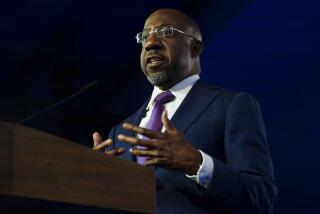Does Newt Gingrich’s Georgia win make him relevant on Twitter?
- Share via
Newt Gingrich had fallen by the wayside on Twitter.
In January, the week after he decisively took South Carolina from assumed GOP front-runner Mitt Romney, the social media universe buzzed with Gingrich talk.
The last week? Not so much.
MOOD METER: Track political social sentiment
San Francisco-based Kanjoya, which tracks social sentiment around the remaining Republican presidential hopefuls, found emotion in nearly 209,000 tweets tied to Gingrich between Jan. 23-29.
Between Feb. 28 and March 5, the company found only about 36,500 emotional tweets mentioning Gingrich
“Gingrich’s volume of emotional tweets has definitely fallen off -- more than 80% -- as he has slipped in the national polls and struggled in numerous primaries,” said Kanjoya founder Armen Berjikly, whose company uses a computer algorithm to determine emotion in tweets.
Then came Gingrich’s Georgia victory Tuesday. In the hour after the Associated Press called the race, Kanjoya officials detected a 10-fold increase in Twitter activity about Gingrich.
Hours earlier, Kanjoya officials had tracked a spike in “joy” around Gingrich after reports that exit polls forecast a win in the state he had served in Congress for two decades.
So which came first? Did positive feeling about Gingrich foretell success in a must-win state for his struggling bid? Or did Twitter simply react to news once it happened?
As sentiment analysis attempts to gain a foothold among traditional political polling and focus groups, that remains a key question.
“Often social media is a reactive media,” said Marc A. Smith, a sociologist who founded the Silicon Valley-based Social Media Research Foundation.
Smith, who has described social sentiment analysis as being in its “Model T Ford era,” said people’s public thoughts may prove revealing. He’s just not sure how much is measurable yet.
“Say there’s nuggets of great value in the conversations of people in social media.” Smith said, “The question to be addressed is: Is social media an adequate replacement for several well-established, even if faltering, techniques; focus groups, polling, the telephone?”
As far as Gingrich goes, Kanjoya engineer Moritz Sudhof said when they dug deeper, they saw some interesting patterns to the uptick in conversation.
“He did win Georgia today,” Sudhof said, “but a lot of the tweets [a full 20% of the emotive tweets from the last hour] are actually comments on the fact that he’s getting Secret Service protection now.”
“We’re also seeing many tweets with a significant amount of ‘surprise,’ indicating that there’s also a level of disbelief and astonishment,” he added.
Tweeted @brucepknight, a self-described “staunch Obama supporter”: “I can’t believe Gingrich is getting SS protection. He has no chance to be the nominee. This is all ego driven.”
In any case, the Gingrich bounce looked potentially short-lived. As news came about wins by Romney and Rick Santorum elsewhere, tweets about Gingrich quickly dropped.
More to Read
Get the L.A. Times Politics newsletter
Deeply reported insights into legislation, politics and policy from Sacramento, Washington and beyond. In your inbox twice per week.
You may occasionally receive promotional content from the Los Angeles Times.











